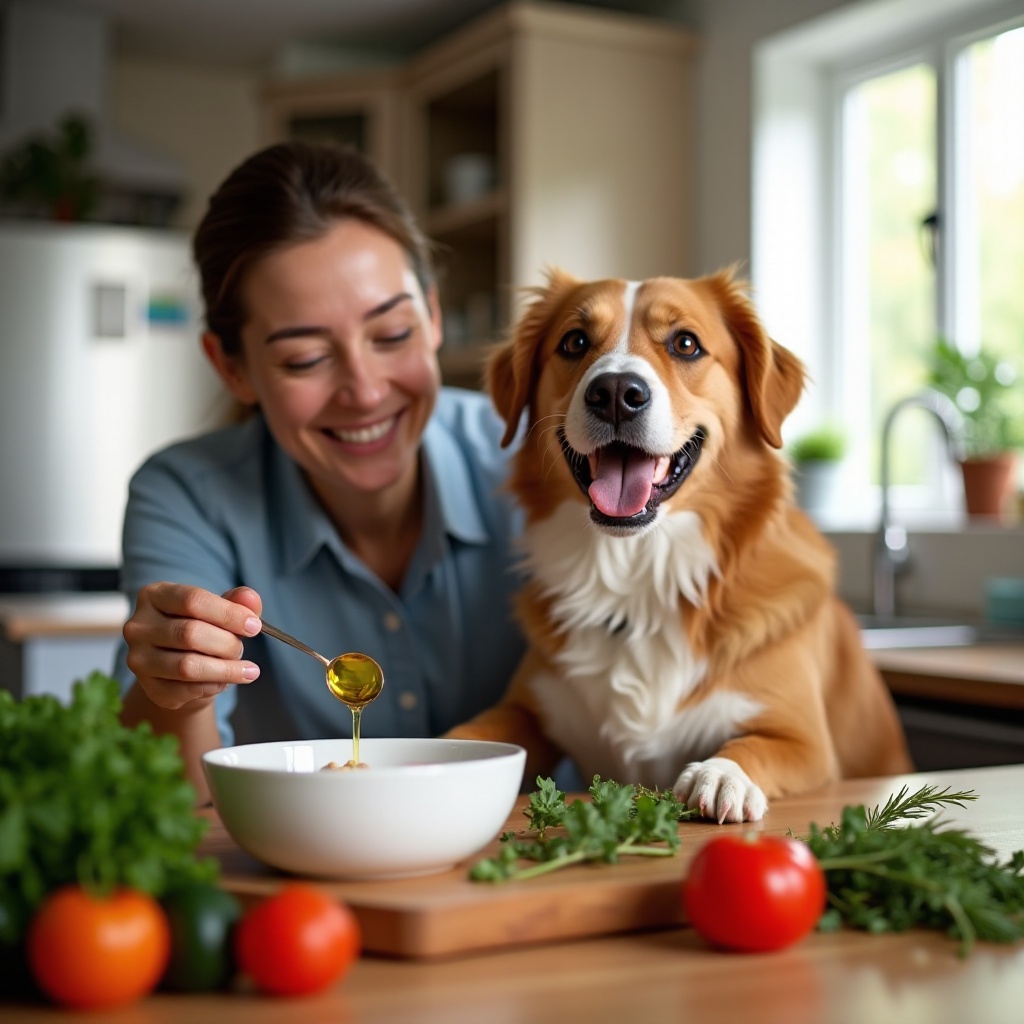Introduction
If you’ve been curious about whether you can add olive oil to your dog’s food, you’re not alone. Many dog owners are exploring the potential benefits of incorporating olive oil into their pets’ diets. Known for its array of nutritional perks for humans, olive oil is increasingly under the spotlight for its possible benefits for dogs as well. This article delves into the science behind feeding olive oil to dogs, offering a comprehensive guide on its benefits, potential risks, and how to safely introduce it to your furry friend’s meal plan.

The Nutritional Benefits of Olive Oil for Dogs
Olive oil is packed with essential nutrients and antioxidants that can provide several health benefits for dogs. It is rich in monounsaturated fats, particularly oleic acid, which can help in reducing harmful cholesterol levels, thereby promoting heart health. Additionally, olive oil contains high levels of vitamin E, a powerful antioxidant that supports the immune system.
For dogs, these components contribute to enhanced coat health, giving their fur a glossy and moisturized appearance. Olive oil is also beneficial for weight management in dogs, as the healthy fats help in satiety and metabolism. Moreover, the anti-inflammatory properties of olive oil can aid in alleviating arthritis symptoms, making it an excellent supplement for aging dogs or those suffering from joint issues.
How Much Olive Oil is Safe for Dogs?
Knowing the right dosage is crucial when introducing olive oil to your dog’s diet. Too much of a good thing can lead to adverse effects. A general guideline is to add one teaspoon of olive oil per 20 pounds of your dog’s body weight per day. For smaller dogs, start with less than half a teaspoon and gradually increase as needed.
It’s essential to monitor your dog’s response to the olive oil. Observe any changes in their behavior, energy levels, and stool consistency. If you notice any signs of digestive upset or unusual lethargy, it may be wise to reduce the dosage or consult a veterinarian.
How to Introduce Olive Oil to Your Dog’s Diet
Introducing olive oil to your dog’s diet should be done gradually to avoid gastrointestinal issues. Start by adding a small amount—about a quarter of the recommended dosage—to their regular food. Mix it well to ensure it’s evenly distributed, and observe how your dog reacts over a few days.
- Start slow: Begin with a small quantity to gauge your dog’s tolerance.
- Mix well: Ensure the olive oil is thoroughly mixed with regular food.
- Gradual increase: Gradually increase the amount until you reach the recommended dosage.
- Monitor reactions: Keep a close eye on any changes in behavior, energy level, or digestion.
By following these steps, you can safely incorporate olive oil into your dog’s diet and reap the nutritional benefits it offers.

Potential Risks and Side Effects
While olive oil can provide many benefits, there are potential risks and side effects to be aware of. Overconsumption can lead to gastrointestinal issues such as diarrhea or vomiting. Dogs with sensitive stomachs may be more prone to these side effects, so it’s crucial to introduce the oil slowly and monitor their reaction.
Additionally, olive oil is calorie-dense, which could contribute to weight gain if not moderated. Dogs on a strict diet for weight management should have their caloric intake carefully monitored when olive oil is added to their food.
Some dogs may also have an allergic reaction to olive oil, although this is relatively rare. Symptoms of an allergic reaction can include itching, swelling, and respiratory problems. If any of these symptoms occur, discontinue use immediately and consult your vet.
It’s also worth mentioning that olive oil, being a fat, can potentially interfere with the absorption of other nutrients if not balanced properly in the diet. Therefore, always discuss with your veterinarian before making olive oil a staple in your dog’s meals.
How to Choose the Best Olive Oil for Your Dog
Not all olive oils are created equal, so choosing the right type is crucial for maximizing the benefits for your dog. Extra virgin olive oil (EVOO) is often recommended due to its high-quality, unrefined nature. This type of olive oil undergoes minimal processing, ensuring that it retains more of its natural antioxidants and nutrients.
When shopping for olive oil, look for labels that indicate the oil is cold-pressed. This means that the oil was extracted without excessive heat, which helps preserve its beneficial properties. Organic olive oils are also a great choice, as they are typically free from pesticides and other harmful chemicals.
Ensure the olive oil is stored in a dark, cool place to maintain its freshness and effectiveness. Exposure to light and heat can degrade the oil, reducing its nutritional value.
By opting for high-quality olive oil, you can provide your dog with a beneficial, nutritious supplement that supports their overall health and well-being.

Conclusion
Adding olive oil to your dog’s diet can offer numerous health benefits, from a shinier coat to improved heart health and joint function. However, it’s crucial to introduce it gradually, stick to the recommended dosages, and monitor your pet’s reaction. As with any dietary change, consulting your veterinarian provides additional assurance that you’re making the best decision for your furry friend. Quality matters, so always choose the best olive oil for maximizing the health benefits. If done correctly, olive oil can be a valuable addition to your dog’s nutrition plan, promoting a healthier, happier life.
Frequently Asked Questions
Is olive oil good for dogs with dry skin?
Yes, olive oil is excellent for dogs with dry skin. The natural fats and vitamin E in olive oil can moisturize the skin from within, reducing itchiness and promoting a healthier coat.
Can olive oil upset my dog’s stomach?
While olive oil is generally safe for dogs, introducing it too quickly or in large quantities can cause gastrointestinal upset, such as diarrhea or vomiting. It’s essential to start with small amounts and gradually increase.
What type of olive oil is best for my dog?
Extra virgin olive oil is the best choice for your dog due to its unrefined nature and higher nutritional value. Look for cold-pressed and organic options to ensure the highest quality.
